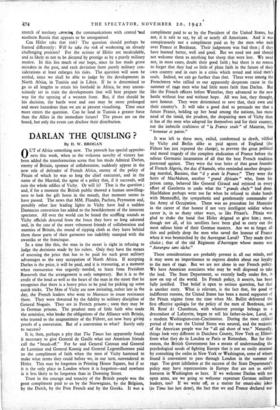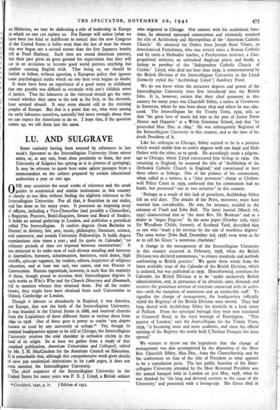DARLAN THE QUISLING ?
By D. W. BROGAN
UT of Africa something new. The proverb has special apposite- ness this week, when to the welcome novelty of victory has been added the transformation scene that has made Admiral Darlan, enemy of Britain, sponsor of collaboration, suddenly appear in the new role of defender of French Africa, enemy of the policy of Petain of which he was so long the chief executant, and in the name of the Marshal, the agent of a policy that, if it succeeds, will ruin the whole edifice of Vichy. Or will it? That is the question ; and, if for a moment the British public showed a human unwilling- ness to look the gift horse in the mouth, that moment seems to have passed. The news that MM. Flandin, Pucheu, Peyrouton and, possibly other late leading lights in Vichy have had a sudden Damascus conversion has added to the bewilderment of the innocent spectator. All over the world can be heard the scuffling sounds as Vichy officials descend from the fence they have so long adorned and, in the case of the more vehement friends of collaboration and enemies of Britain, the sound of ripping cloth as they leave behind them those parts of their garments too indelibly stamped with the swastika or the francisque.
In a time like this, the man in the street is right in refusing to judge the decisions made by his rulers. Only they have the means of assessing the price that has to be paid for such great military advantages as the easy occupation of North Africa. If accepting Darlan is the price, it will be paid, and it is reassuring, at a moment when reassurance was urgently• needed, to learn from President Roosevelt that the arrangement is only temporary. But it is to the credit of the head as well as the heart of the man in the street that he recognises that there is a heavy price to be paid for picking up some quick tricks. The Men of Vichy are now imitating, rather late in the day, the French leaders who went to Morocco to rouse resistance there. They were thwarted by the fidelity to military discipline of General Nogues. They are in French prisons ; soon they may be in German prisons. The prudent men of little faith who made the armistice, who broke the obligations of the Alliance with Britain, who trusted to the magnanimity of the Ffihrer, are now busy giving proofs of a conversion. But of a conversion to what? Surely only to success?
It is, then, perhaps a pity that The Times has apparently found it necessary to give General de Gaulle what our American friends call the "brush-off." For he and General Catroux and General de Larminat and General Koenig and General Legentilhomme paid us the compliment of faith when the men of Vichy hastened to make what terms they could before we, in our turn, surrendered to Hitler. This may be forgotten in Printing House Square, but if so it is the only place in London where it is forgotten—and nowhere is it less likely to be forgotten than in Downing Street.
Trust in the courage and tenacity of the British people was the great compliment paid to us by the Norwegians, by the Belgians, by the Dutch, by the Free French and by the Greeks. It was a compliment paid to us by the President of the United States, but not, it is safe to say, by all or nearly all Americans. And it was conspicuously not a compliment paid us by the men who took over France at Bordeaux. Their judgement was had then ; if they have learned better, well and good. But we need not and should not welcome them as anything but sheep that were lost. We need not, in most cases, doubt their good faith ; but there is no reason to forget that they had so little of plain faith in the future of their own country and in ours in a crisis which tested and tried men's souls. Indeed, we can go further than that. There were among the Frenchmen who rallied to our apparently desperate cause in the summer of 1940 men who had little more faith than Darlan. But like the French officers before Waterloo, they advanced to the new battle without fear and without hope. All was lost, they thought, save honour. They were determined to save that, their own and their country's. It will take a good deal to persuade me that a future France, holding up her head among the nations, has more need of the timid, the prudent, the despairing men of Vichy than it has of the men who adopted for themselves and for their country, not the imbecile craftiness of "la France seule" of Maurras, but "honneur et patrie."
It was left to these men, exiled, condemned to death, vilified by Vichy and Berlin alike as paid agents of England (the Fiihrer has just repeated the charge), to prevent the great political and moral tragedy of the complete abdication of France before the odious Germanic incarnation of all that the best French tradition protested against. They were the true heirs of that great founder of French Algeria, the duc d'Aumale, who reminded another despair- ing marshal, Bazaine, that "il y avail la France." They were the heirs of MacMahon, another "grand Africain" who, from his prison camp, behaved like General Giraud and rejoiced in every effort of Gambetta to undo what the " grands chefs" had done. MacMahon perhaps went too far when he refused to shake hands with Menteuffel, the sympathetic and gentlemanly commander of the Army of Occupation. There was no precedent for Montoire in the career of that honest if not very intelligent soldier whose career is, in so Many other ways, so like Petain's. Petain was glad to shake the hand that Hitler deigned to give him ; most, though not all, of his satellites have been glad to carry out the most odious hints of their German masters. Are we to forget all this and politely drop the men who saved the honour of France when it was besmirched by the Auvergnat Laval? They made their choice ; that of the old Regiment d'Auvergne whose motto was " Auvergne sans tiiche."
These considerations are probably present in all our minds, and it may seem an impertinence to express doubts about our loyalty to the men of 1940. But we are not alone in our French policy. We have American associates who may be well disposed to take the lead. The State Department, so recently badly under fire, is now on top of the world. Its French policy, it asserts, has been fully justified. That belief is open to serious question, but that is another story. What is relevant, is the fact that, for good or indifferent reasons, the United States has been a moral supporter of the Petain regime from the time when Mr. Bullitt delivered the first effective apologia for the policy of the men of Bordeaux, and M. Rene d! Chambrun, with whatever prestige belongs to a descendant of Lafayette, began to sell his. father-in-law, Laval, as a modern Washington-cum-Cincinnatus. During the most critical period of the war the United States was neutral, and the majority of the American people was for " all aid short of war." Naturally, things look very different in Dutchess County, New York or. Illinois from what they do in London or Paris or Rotterdam. But for that reason, the British Government has a means of understanding the psychological needs of fighting Europe that is not so easily attained by consulting the exiles in New York or Washington, some of whom found it convenient to pass through London in the summer of 1940. Too great jubilation at the success of the State Department's policy may have repercussions in Europe that are not as easily foreseen in Washington as here. If we welcome Darlan with too open arms, are we going to welcome repentant German military leaders, too? If we write off, as a matter for smart-alec jokes (as Time has just done), the fact that we and France declared war
on Hitlerism, we may be abdicating a role of leadership in Europe in which no one can replace us. For Europe will notice (what we have been too kind or indifferent to notice) that the new Congress of the United States is fuller even than the last of men for whom this war began not a second sooner than the first Japanese bombs fell at Pearl Harbour. Such men are sound American patriots, but their past gives no great ground for expectation that they will see in an invitation to become good world patriots anything but another cunning English trick. That being so, we should be foolish to follow, without question, a European policy that ignores some psychological truths which no one here even begins to doubt.
It must have been an experience of a good many in childhood that one parable was difficult to reconcile with one's childish sense of justice. That the labourers in the vineyard should get the same reward whether they came to the task at the first, or the eleventh, hour seemed absurd. It may seem absurd still to the resisting peoples of Europe. But that is a point that we, who were among the early labourers ourselves, naturally feel more strongly about than we can expect the Americans to do so. I hope that, if the question comes up, we tell them just the same.



























 Previous page
Previous page